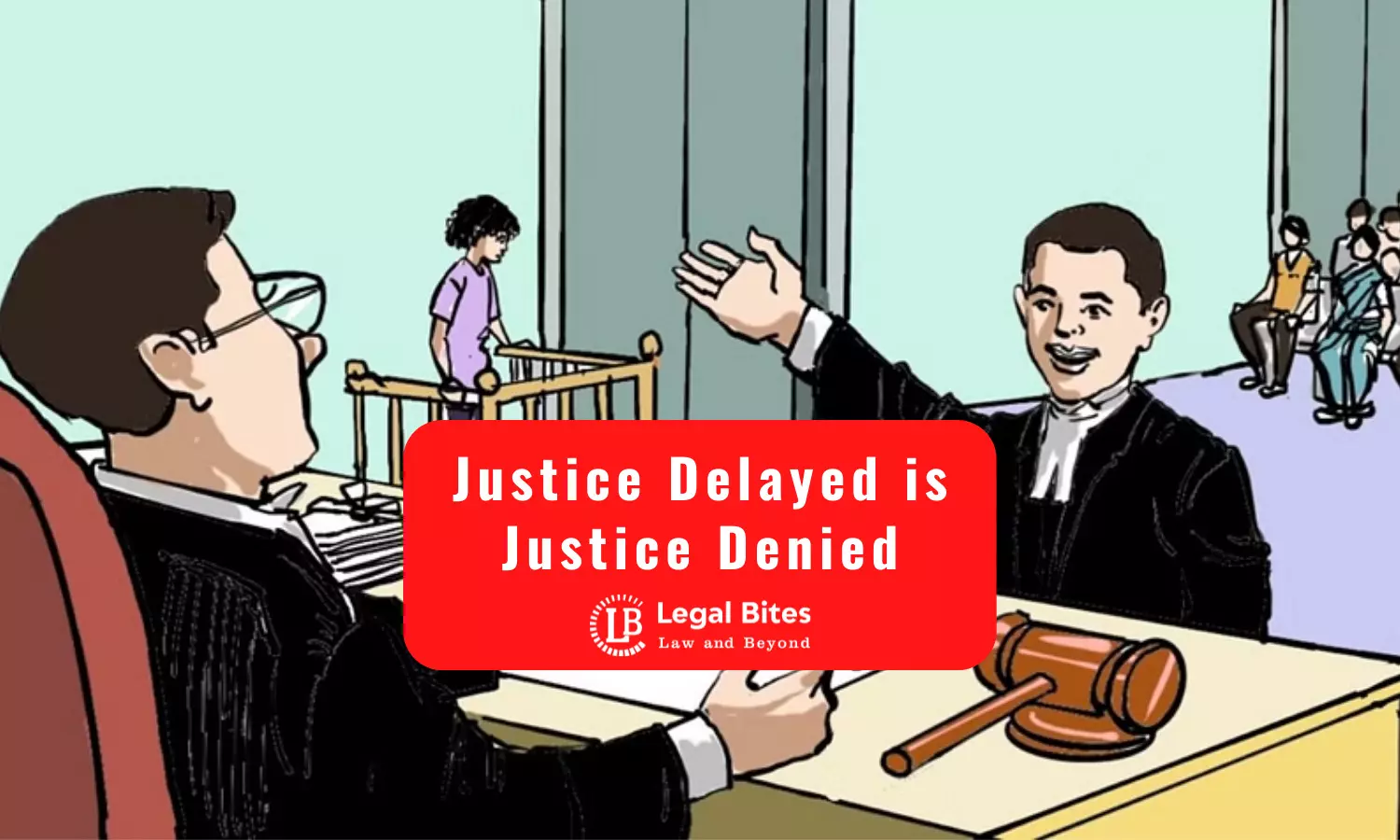Justice Delayed is Justice Denied
The article 'Justice delayed is justice denied' explores the nuances of justice, especially when the same is delayed due to certain factors.

The article 'Justice delayed is justice denied' by Snehil Sharma explores the nuances of justice, especially when the same is delayed due to certain factors. The article will also discuss the relevant case laws for understanding the same in depth.
Introduction
For the wounded party who suffered the injury and had little chance for a prompt and effective remedy and resolution, this principle serves as the foundation for the right to a speedy trial and similar rights that are aimed to accelerate the judicial system. The phrase has become a rallying cry for legal reformers who believe that courts, tribunals, judges, arbitrators, administrative law judges, commissions, or governments move too slowly to resolve legal issues — either because the case is too complex, the current system is too complex or overburdened, or because the issue or party in question does not enjoy political favour. Judicial hesitation to rule on specific issues could have an impact.
Injustice anywhere is a threat to justice: Brief Explanation
Injustice everywhere is a threat to justice everywhere, stated Dr. Martin Luther King in 1963. He believed that we are bound together in a single garment of destiny, entangled in an unbreakable web of reciprocity. Everything that directly affects one indirectly affects everyone. We can never again afford to accept the constrictive notion of "outside agitator."
To resolve disputes and uphold national peace and order, each nation has its own laws and regulations. Injustice anywhere is a threat to justice everywhere, as Martin Luther King Jr. famously observed is an idiom that highlights how injustice in one part of the world can jeopardize the fight for justice for all around the globe. Justice is correctly referred to as the shield of the innocent and the protector of civil rights. Generally speaking, one goes to court to obtain justice, but when that justice is delayed, people lose hope and the justice is therefore withheld. The idiom "Justice delayed is Justice denied" was used by William Edward Gladstone, a former Prime Minister of England. It signifies that if justice is not done at the appropriate moment, even if it is done later, it will not be true because there was a lack of justice when justice was needed.
Primary reasons for the delay in Justice
Typically, attorneys handle multiple cases concurrently in different courts and accept adjournment as a given to handle numerous cases concurrently.
Unfortunately, our system lacks any law or statute that would specify a deadline for case closure. And everyone used it to their advantage, showing no urgency to wrap up the case.
Today's generation of lawyers is engaged in the practice of law more for profiteering purposes than for serving their clients. Because there are not enough judges for the number of people in our country, justice is hampered. India has more than 100 crore people, yet only 17, 615 of them are judges. Lawyers are typically hired to represent cases before judges in order to resolve conflicts and ensure adequate justice, although these days it is common for lawyers to request adjournments. The cause is the passing of distant relatives who performed family duties. Although attorneys are compensated for their attendance and time, costs and case backlogs grew with each dismissal.
Case Laws
1. Doshipura Graveyard Case (1981 AIR 2198)
The duration of this trial is the longest in Indian history. In contrast to others, it began in 1878 and has continued for more than a century, up to the present. Commenced in the 1870s, and even though a decision was made in 1981, it was never carried out. The Shias and Sunnis of Doshipura continued to file new claims and request additional clarifications regarding their issues as recently as 2014. The nine plots in Doshipura that Shias allege were given to them by the Maharaja of Varanasi for delivering religious sermons and recitations during Muharram are at the centre of the controversy, but Sunnis assert that portion of the area was their graveyard.
2. Nirbhaya Case [(2017) 6 SCC 1]
The Nirbhaya case, a three-judge bench decision presided over by Justice R Bahumathi and other judges Justice Bhushan and Justice A S Bopanna is the most egregious instance of justice being delayed. All 4 of the men, who were found guilty in the 2012 Nirbhaya gang rape and murder case, were hanged seven years after the heinous crime.
3. Uphaar Cinema Case [II (2003) ACC 114]
The 59 persons who died and more than 100 others who were injured in a fire that started at the movie theatre on June 13, 1997, waited 18 years for the court to deliver justice. Gopal and Sushil Ansal avoided jail time by paying a fine of 60 crore rupees. The Uphaar cinema case is a notorious example of delay and disproportionate injustice amid protests, reduced compensation, and a penalty that is equal to none.
4. Aarushi Murder Case (Criminal Appeal No. - 293 of 2014)
Similarly to that, everyone has the constitutional right to a fair trial. However, this privilege is frequently overlooked in situations like the murder of Aarushi. The court's conclusion that Rajesh and Nupur Talwar, the parents of Aarushi, were responsible for the two killings was unaffected by the absence of evidence, witness testimony, or even narcoanalysis. Justice for the victims has been inextricably delayed since 2008 as a result of the case's stagnation in a Catch-22 position.
5. Pallavi Purkayastha Murder Case
The murder of Pallavi Purkayastha is another case in which justice has not been served. Sajjad Mogul was not given the death penalty by the Sessions Court, which disregarded the Supreme Court's rules on "rarest of rare situations" and instead gave him a life sentence. After jumping his parole, which was granted to him in February 2016, Mogul has yet to be located, and the police are unaware of his location. A minor failure to follow the rules set forth has permitted the offender to escape punishment.
The Strength of Judges is inadequate according to population and a bunch of cases
The lack of sufficient judges is another major factor in the delay of justice in India. There are only around 21,000 Judges in India. 10 Judges per million people is the current judge-to-population ratio. At least 50 to 1 million are suggested by the Law Commission report from 1987. Since 1987, the population has grown by more than 25 crores. Problematic is that the States argue that the Center should take the lead in raising the number of judges while the Center insists that the States do so. Additionally, there aren't enough judges, and those who are assigned to the bench are often absent, particularly in High Courts.
Competency of the Other Staff in Court
It is also important to note that along with the quantity of staff available in the courts, it is equally crucial for them to be efficient enough for performing their tasks quickly and effectively. This is where the Indian courts can also be put into question where the number of pending cases only seems to increase with every passing day. Therefore it becomes important to understand that there is a need to create and maintain a quality check for adjudging the competency of the other staff in court.
How to improve Courts Efficiency
Court efficiency can be improved in the following ways:-
- ADRs (Additional Dispute Resolutions) are established in order to lessen the workload of the courts.
- By streamlining the process for a quick trial.
- Through ensuring the openness of the legal system.
- The expansion of information technology's role in the judicial system.
- Raising the standard of law graduates
- Legal advice: Be succinct, bright, and off.
- Increase in the number of judges from lower to higher levels.
- The courts are being streamed live.
- Especially at the top level, reducing corruption in the judiciary.
- Ending the Judges' post-retirement employment.
- A judiciary that enjoys the confidence of the public must employ honest and capable individuals, especially in the upper judiciary.
Suggestions
- It is important to educate all of the country's citizens on the importance of law and order as well as their individual rights to seek justice.
- Additionally, each individual should be given a position in Lok Adalat, which helps to offload some of the weight from lesser courts.
- The removal of pointless justifications for adjournments is the most crucial adjustment that has to be made in the judiciary since they waste the court's time and force the court to levy fines for absurd justifications for adjournments.
- Reduced court case volume and discouragement of frivolous litigation are both necessary.
Conclusion
The discussion above leads us to the conclusion that we shouldn't use extraordinary haste to resolve cases. In the same way that "justice withheld is justice denied," it is also true that "justice hastened is justice buried." Therefore, it is essential to natural justice and the balance of convenience that each case be given a sufficient, reasonable, and due hearing while taking its circumstances into account. An immediate need exists for action. By establishing the essential norms, Indian courts' effectiveness can be improved. Making the necessary progress in judicial reforms will take the concerted and cumulative efforts of everyone. For real change to occur, fundamental reforms and a strong resolve are required.
References
[1] Prachi Darji, Delayed Justice: The Captivity of Indian Judiciary, Available Here
[2] Sumeda, The clogged state of the Indian judiciary, Available Here
[3] Pragya Rai, Justice delayed is Justice Denied, Available Here
Important Links
Law Library: Notes and Study Material for LLB, LLM, Judiciary, and Entrance Exams

